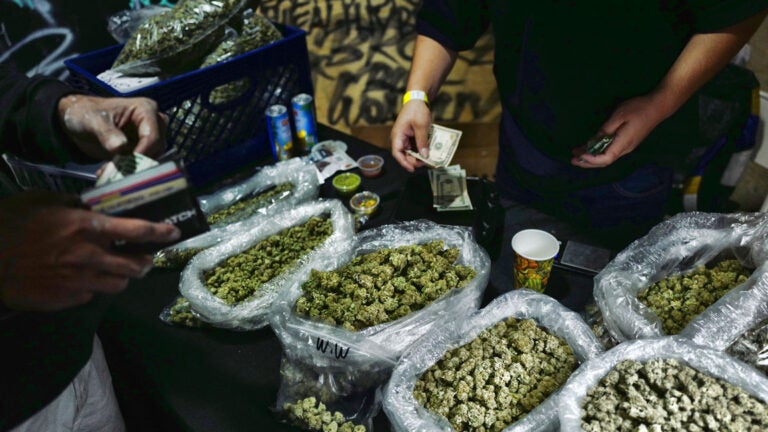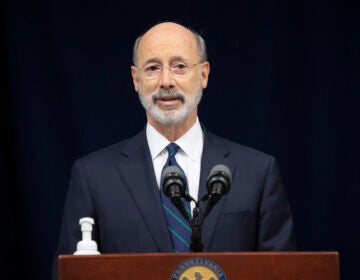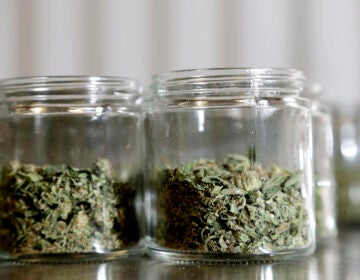Clock running down for NJ’s troubled marijuana legislation
The push for legal weed remains mired in internal Democratic wrangling and is headed for a confrontation this Friday.

Clock running down for NJ’s troubled marijuana legislation. (AP Photo/Richard Vogel)
This article originally appeared on NJ Spotlight.
—
The push for legal weed remains mired in internal Democratic wrangling and is headed for a confrontation this Friday.
What seemed like a done deal on Nov. 3, when two-thirds of voters approved a constitutional amendment to legalize adult recreational use, followed by the passage of enabling legislation last month, may be unraveling once again.
Gov. Phil Murphy set Friday as the deadline for the Legislature to fix a flaw in the cannabis legalization legislation passed on Dec. 17. In the latest face-off between the two government branches, Murphy is demanding that lawmakers immediately pass an additional “cleanup bill” to correct conflicting provisions in the measure concerning how law enforcement treats minors found in possession of pot. Otherwise, he said he will conditionally veto both bills, according to published reports and supported by three people intimately involved in the discussions.
The governor’s office did not respond to a request for comment, but negotiations continued without resolution Thursday between the governor’s office and legislative leaders, according to Sen. Nicholas Scutari, sponsor of the legalization bill.
Fix the bill after it’s passed?
“I understand the governor’s concerns — I actually agree with him — but we just didn’t have the votes to get it done,” said Scutari, who has been trying to legalize marijuana in New Jersey for a decade. “But there comes a time when we need to get this moving. There are many things we’re going to have to go back and fix later.”
Staff from the governor’s office are scheduled to meet at 8 a.m. Friday with members of the Black Legislative Caucus to see if they can resolve their differences with Murphy regarding penalties for minors, according to a person involved in negotiations.
Several vastly different outcomes are riding on that meeting. They include:
- Lawmakers immediately pass a cleanup bill that satisfies Murphy, which is unlikely.
- Murphy issues a conditional veto with proposed changes, which would force the Legislature’s hand.
- Murphy signs the current bills, as they were passed, with an assurance from the Legislature that a cleanup bill will follow in the near future, a move Scutari supports.
If Murphy were to issue a conditional veto of the two bills, that would put the ball back in the Legislature’s court. Lawmakers could accept the changes with a majority vote, and ensure the governor’s signature. That’s a nonstarter, one legislative source said and Senate President Steve Sweeney has unequivocally stated that the Senate will not entertain a conditional veto. That means the bills would die, and the legislative process would be pushed back to square one.
Putting up a new bill could even be pushed back to next year, one legislative source said.
Clearing up contradictions
The problem, Murphy has insisted, lies in contradictions in the two cannabis bills passed on Dec. 17 — one that decriminalizes possession, the other that legalizes it and establishes the framework of a new regulated market. His office didn’t catch what it calls contradictions in the bills before they landed on the governor’s desk.
Under the legalization bill, anyone under 21 caught with less than 1 ounce of “cannabis” — which the Legislature has defined as legal pot — could be charged with a petty disorderly person’s offense. But the decriminalization bill removed penalties for those under 21 caught possessing “marijuana,” a term that refers to black-market weed. Murphy has said he wants to see civil penalties, like small fines, established instead.
The cleanup bill crafted by legislative leaders and the administration earlier this month was passed in an Assembly committee, but couldn’t survive a Senate caucus session under the considerable heat brought by Sens. Ron Rice and Nia Gill — two Black Democratic lawmakers who have been vocal opponents of the legalization legislation. As a result, the bill’s sponsors, Scutari and Sen. Teresa Ruiz, pulled their names from the bill and the measure died.
“This is precisely what I’ve been arguing for a long time. My whole agenda is to keep kids out the criminal justice system. I cannot support anything that drives more Black and brown kids into the system,” Sen. Ruiz told NJ Spotlight News at the time.
Her words underscore the argument put forth by Rice and Gill — that the compromise provisions in the cleanup bill would fly in the face of the social and racial justice reforms, which are the underlying force of legalization. The new language, they said, would encourage more confrontation between police and minority citizens and green light the return of rejected stop-and-frisk practices.
“The last thing any of us want is our kids getting tied up in the criminal justice system, especially kids of color,” Murphy answered publicly last week. “And secondly, the voters voted to legalize adult-use marijuana. It said it right in the referendum, 21 and up, that’s always been the case.”
It was the second time this year the bills stalled because of last-minute concerns over racial and social justice. The debate for the high road in the state’s liberal wing resumed.
Criticism from the faith community
Soon after came a letter sent to NJ.com and signed by 40 faith leaders and social justice advocates, which resolutely backed Murphy’s point of view and rejected objections raised by Rice, Gill and members of the Black and Latino caucuses.
“It has recently come to our attention that two bills on the governor’s desk would legalize marijuana not only for adults, but would also inadvertently do so for children. As faith leaders, we unequivocally and unconditionally oppose any measure to legalize marijuana for kids,” the Jan. 23 letter stated. “We have faith in Gov. Phil Murphy, who has always listened closely to us as faith and community leaders, to strike this balance.”
As negotiations between Murphy and lawmakers continued behind the scenes this week, a majority of Democratic senators offered a different compromise: They signed a letter asking Murphy, at the very least, to sign the decriminalization bill as they work on the language in the legalization bill.
“The bills on your desk do not need to be signed together and they do not conflict with each other,” the letter said. “The goal of the decriminalization bill is to protect individuals operating in the underground market — primarily persons of color — from being punished for possession and distribution of small amounts of marijuana.”
Murphy, it appears, did not respond to that option.
“The long debate over whether to legalize marijuana for adults in New Jersey ended in November when the public voted overwhelmingly to support it,” said Bill Caruso, an attorney and lobbyist who has been intimately involved in the movement to legalize marijuana for years. “It’s abundantly clear that no one wants criminal penalties for marijuana, nor did anyone support the legalization of cannabis for minors … Further inaction only allows for continued arrests for marijuana and completely flouts the will of the voters.”

Get daily updates from WHYY News!
WHYY is your source for fact-based, in-depth journalism and information. As a nonprofit organization, we rely on financial support from readers like you. Please give today.






